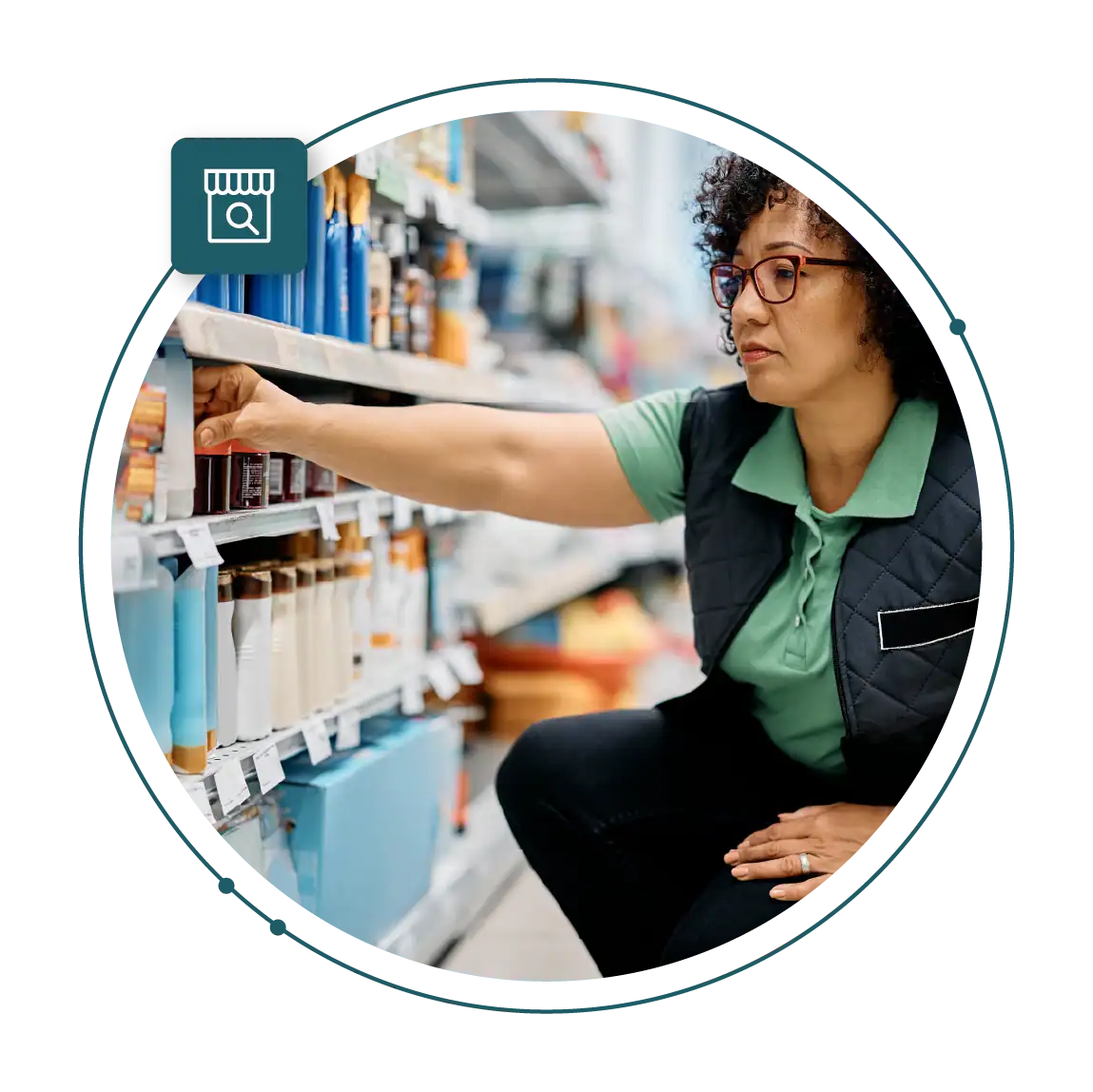Signal to Shelf Mastery: A CPG Guide to Ensuring On-Shelf Availability Through Precision Forecasting
Retailer data, consumer signals, and promotional metrics – even with all this information available at your fingertips, are you able to maintain accurate forecasts and ensure your products are available when consumers need them? Traditional planning approaches, slowed by disconnected data and limited collaboration, can prevent even the most data-rich Consumer Packaged Goods (CPG) brands from responding quickly to real-time market shifts. The result? Lost sales, frustrated customers, and service levels that never quite hit their targets.
But what if you could actually improve data accuracy and short-term forecasting, anticipate market needs, and respond swiftly to keep shelves reliably stocked?

The hidden costs of disconnected supply chain data
Today’s CPG companies face a perfect storm of supply chain challenges that make consistent on-shelf availability feel nearly impossible.
Fragmented data systems create a maze of inconsistencies. When retailer data doesn’t align neatly with your internal platform, this can lead to forecast inaccuracies and inventory misalignments that cascade throughout your entire network.
Manual complexity slows you down when speed matters most. Over-reliance on spreadsheets for complex SKU mapping and demand data creates bottlenecks, increases errors, and leaves you unable to adapt quickly when demand shifts unexpectedly.
Inflexible forecasting keeps you looking backward instead of forward. Traditional methods typically can't incorporate near-term retailer insights effectively, leaving you always one step behind actual consumer demand.
Disconnected collaboration creates silos and delayed responses. When teams, retailers, and distributors can't communicate and react effectively to unexpected demand shifts, it can drag down service levels and lead to unhappy customers.

How one CPG brand transformed its forecast accuracy
A prominent CPG brand in the food and beverage industry was stuck in a cycle of frequent stockouts. Forecast inaccuracies and cumbersome manual SKU mapping across retailers were leaving some shelves empty. Their sales and customer satisfaction were taking a hit, and traditional solutions weren’t cutting it.
Then they adopted e2open’s connected platform.
The transformation was notable.
3%
increase in on-shelf availability — translating directly to boosted sales
30%
reduction in excess inventory — lowering operational costs
40%
improvement in forecast accuracy — enhancing planning effectiveness
How? By harmonizing data across systems and streamlining SKU mapping, using insights from AI-driven demand sensing to adjust forecasts as needed, and enabling multi-tier inventory optimization to reduce excess inventory.
The result: meeting customer service level (SLA) targets that restore customer trust and strengthen brand loyalty.
Four strategies that turn data into shelf confidence

- Synchronize data and demand signals for pinpoint forecasts
Transform your planning approach from inside-out guessing to outside-in precision. By harmonizing SKU definitions across partners and platforms, you create a single source of truth that eliminates the misalignments eroding your forecast reliability.
Advanced AI-driven demand sensing turns daily point-of-sale, inventory, and promotional data into near-real-time insights. When you can surface short-term shifts in shopper behavior early, you can recalibrate forecasts and production targets before stockouts or excess inventory materialize.

- Incorporate collaborative planning that keeps everyone aligned
Break down the silos that slow you down. When customers, distributors, and inventory teams work on a collaborative planning solution—continuously fed with granular point-of-sale data and near-term demand forecasts—communication barriers disappear, decision-making accelerates, and everyone stays focused on the same, up-to-date demand picture.

- Deploy dynamic inventory management
Multi-tier inventory optimization balances safety stock, in-transit, and store-level inventory against the most current demand signals. By continuously re-optimizing these buffers, you maintain high service levels while freeing working capital that was formerly trapped in oversupply.

- See the full picture from sales to stock
When your entire team can see what’s selling today and what’s projected to sell tomorrow, potential service-level risks and replenishment opportunities surface sooner. This enables rapid, coordinated actions that protect on-shelf availability while trimming excess stock.

- Synchronize data and demand signals for pinpoint forecasts
Transform your planning approach from inside-out guessing to outside-in precision. By harmonizing SKU definitions across partners and platforms, you create a single source of truth that eliminates the misalignments eroding your forecast reliability.
Advanced AI-driven demand sensing turns daily point-of-sale, inventory, and promotional data into near-real-time insights. When you can surface short-term shifts in shopper behavior early, you can recalibrate forecasts and production targets before stockouts or excess inventory materialize.

- Incorporate collaborative planning that keeps everyone aligned
Break down the silos that slow you down. When customers, distributors, and inventory teams work on a collaborative planning solution—continuously fed with granular point-of-sale data and near-term demand forecasts—communication barriers disappear, decision-making accelerates, and everyone stays focused on the same, up-to-date demand picture.

- Deploy dynamic inventory management
Multi-tier inventory optimization balances safety stock, in-transit, and store-level inventory against the most current demand signals. By continuously re-optimizing these buffers, you maintain high service levels while freeing working capital that was formerly trapped in oversupply.

- See the full picture from sales to stock
When your entire team can see what’s selling today and what’s projected to sell tomorrow, potential service-level risks and replenishment opportunities surface sooner. This enables rapid, coordinated actions that protect on-shelf availability while trimming excess stock.
The e2open platform advantage: From demand signals to the retail shelf
E2open’s comprehensive supply chain management platform delivers the connected approach that transforms how CPG brands respond to market demands.
Seamless data harmonization
Simplified SKU mapping between retailers and your internal systems ensures accurate, synchronized data across your entire network.
Real-time demand insights
AI-powered forecasting captures immediate consumer and market trends, enabling swift response to changing demand patterns.
End-to-end collaboration
A unified platform coordinates sales forecasts, orders, inventory, and logistics among all supply chain participants—no more information silos.
Optimized inventory management
Multi-tier inventory optimization dynamically adjusts inventory levels, minimizing both stockouts and excess inventory.
Your journey from retail signals to shelf confidence
Here’s how the e2open platform transforms your supply chain in five connected stages:
- Capture retail signals: Point-of-sale data, consumer trends, promotions, and inventory levels flow seamlessly into your planning process.
- Harmonize and integrate data: SKU matching and validation ensures retailer data harmonizes with your brand’s internal systems.
- Apply near-term demand sensing: Enhanced forecast accuracy across stores, DCs, and brand-level operations using predictive analytics and AI insights from demand data.
- Enable connected collaboration and execution: Aligned stakeholders work together with multi-tier inventory optimization and collaborative response to market shifts.
- Achieve shelf confidence: Improved on-shelf availability leads to higher consumer satisfaction and increased brand loyalty.

Download your complete guide to signal-to-shelf mastery
What you’ll uncover in this comprehensive guide:
- A framework to turn insights into on-shelf precision
- A real-world case study showing 40% forecast accuracy gains and 30% excess inventory reduction
- Solutions to boost near-term forecast accuracy and reduce stockouts
- Methods for adopting an outside-in planning approach

Subscribe to receive e2open updates
Interested in learning more? Stay current with the latest e2open news – from company updates to thought-leadership pieces, and so much more!
Complete this form to subscribe to e2open updates.
Let's get started.


